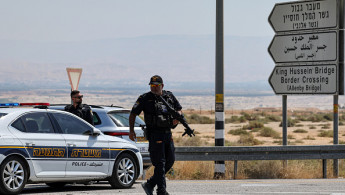West Bank 'under siege' by Israel in retaliation for Jordan border shooting
Israel has closed all land crossings with Jordan, effectively blocking the West Bank, after an armed man killed three border guards at the King Hussein Bridge border on Sunday.
Israel announced that the Karameh, Sheikh Hussein and Wadi Araba crossings would all be closed until further notice, The New Arab’s Arabic language sister publication, Al-Araby Al-Jadeed, reported, a decision which will likely have huge implications for the West Bank's 3 million Palestinian population.
The Karameh crossing is integral for the movement of people and goods between Jordan and the occupied West Bank and its closure has resulted in dozens of trucks loaded with goods being stuck on the border.
The Sheikh Hussein Bridge, in northern Jordan, is primarily used by Israelis, people who hold non-Palestinian nationalities, and diplomats heading to and from Israel, as well as tourists with Israeli visit visas.
The closure of the borders has had a significant impact on trade, effectively putting the West Bank under siege.
The director of the Jordanian Farmers Union, Mahmoud Al-Auran, told Al-Araby Al-Jadeed that trade between Jordan and the West Bank has now completely stopped since Sunday evening, depriving Palestinians there of basic needs and forcing them to purchase Israeli products.
Israeli authorities will likely impose more restrictions and obstacles that will impact trade between Jordan and Palestine, especially on truck drivers, he added.
The Israeli Crossings Authority confirmed the closures of the crossings in a statement.
"Following the incident at the Allenby Crossing, and upon instructions from the security authorities, it was decided to stop all activities at the Yitzhak Rabin, the Allenby, and the Jordan River land crossings," the statement said, referring to the border points by their Israeli names.
The Jordanian Public Security Directorate spokesperson called on people not to use the crossings until further notice and to follow official developments.
A Jordanian economic expert, Hussam Ayesh, told Al-Araby Al-Jadeed that the closure of the crossings could stop $435 million in annual trade and reduce the amount of commercial activity.
According to Ayesh, Israel will likely impose further restrictions on trade in a bid to monopolise the entire Palestinian market with Jordan exporting around $328 million to the Palestinian market a year and importing $97 million in Palestinian goods in 2023.
"Jordan allowed for economic sectors in Palestine to keep going, and any halt in movement of trade exchange will affect the remaining Palestinian economic resources," he explained.
"On the Jordanian side, a halt in the operation of the bridge will be reflected in national exports and production sectors, as some areas will depend on exporting to the Palestinian side."
Concerns have been raised that the closure of the crossings will affect the transfer of humanitarian aid to the West Bank and Gaza, making life difficult for civilians. Israel has conducted a massive assault in the occupied West Bank this month, leading to claims it is trying to forcibly expel the territory's Palestinian population to Jordan.
Israel also detained and interrogated two Jordanian truck drivers on Sunday following the shooting, placing them under investigation.
Jordan’s ministry of interior later confirmed that the men had been released and that investigations surrounding the shooting are still ongoing.




 Follow the Middle East's top stories in English at The New Arab on Google News
Follow the Middle East's top stories in English at The New Arab on Google News


![A group of Palestinians, foreign and Israeli activists gather to participated in an olive picking event on the land in the town of Battir, which is under threat of confiscation by Israel in Bethlehem, occupied West Bank on 8 November 2024. [Getty]](/sites/default/files/styles/image_330x185/public/2182930803.jpeg?h=199d8c1f&itok=__0LgGsa)